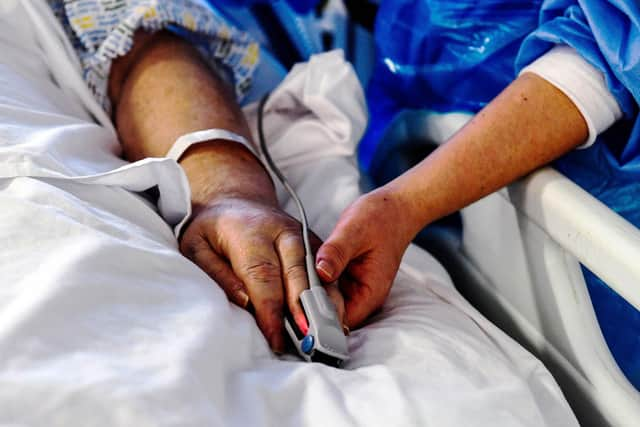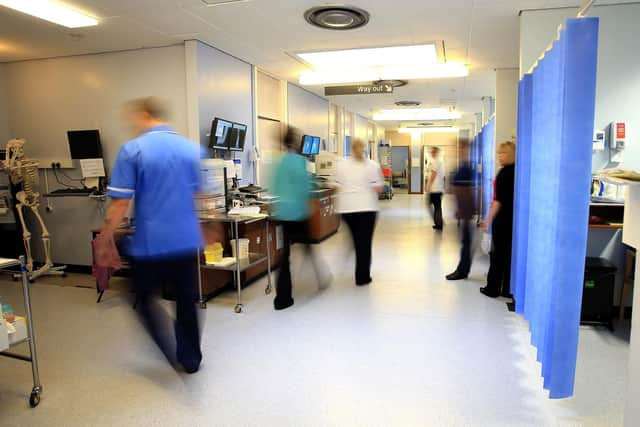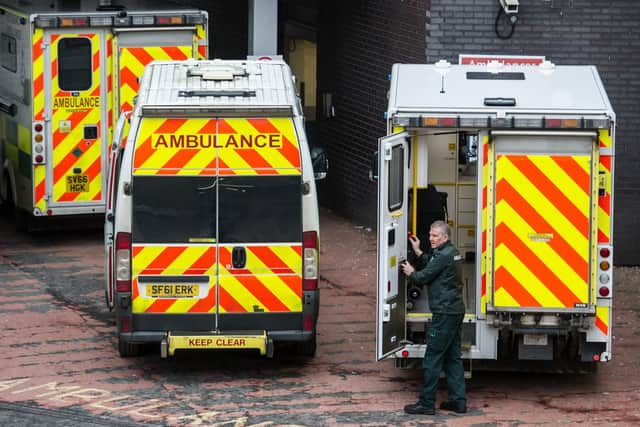NHS Scotland crisis: Medics call for debate on whether NHS should remain free at point of access following bombshell report
Scotland’s top medics have begun questioning whether all treatments on NHS Scotland should be available and free of charge at the point of access, following a damning report from public spending watchdogs.
An Audit Scotland report, which calls for “significant changes” to the way the Scottish Government funds NHS Scotland, has been described as “staggeringly bleak” by medical professionals, who said the report “paints a picture of a health service in crisis, without a plan to address it”.
Advertisement
Hide AdAdvertisement
Hide AdMeanwhile, the Royal College of Physicians of Edinburgh (RCPE) said it was now “legitimate to ask whether we can afford to provide every treatment available, free of charge and at the point of access”.


However, health secretary Neil Gray said: “The fundamentals of Scotland’s NHS will not change; we remain committed to free access to healthcare.”
The comments came as Audit Scotland said the Scottish Government was “unlikely” to meet commitments made in the 2023/24 Programme for Government to reduce both waiting lists and waiting times.
Overall, the public spending watchdog found that while “some progress has been made in reducing some of the longest waits, key targets for eradicating long waits have been missed”.
Professor Andrew Elder, president of the RCPE said “reform alone, in the absence of increased funding, will not save our NHS”.


“At the same time, it is legitimate to ask whether we can afford to provide every treatment available, free of charge and at the point of access,” he said. “If we cannot, which is plausible given the huge increases in medical treatments available, how should we decide what we can provide?
“In order to address these questions, the college believes that a national conversation is required in Scotland, during which the public should have its say on deciding the NHS’s priorities and whether they think more public funds should be diverted to the NHS.
“While politicians will have their views, and doctors can and will wish to advise, the NHS belongs to the public and they must have the main say in its future direction.”
Advertisement
Hide AdAdvertisement
Hide AdDr Iain Kennedy, chair of BMA Scotland, said while Audit Scotland’s annual reports “have consistently raised concerns about the sustainability of NHS Scotland”, this year’s assessment of the health service was “staggeringly bleak”.


“The report confirms the NHS in Scotland, and its workforce, is simply unable to meet the growing demand for health services of our population,” he said. “The service is not financially sustainable and NHS boards face a blackhole in excess of half a billion pounds by 2025/26.
“Staffing – and workforce planning – is woefully inadequate, with increasing vacancies and spending on agency workers, leaving healthcare professionals feeling exhausted and unable to provide safe or effective care, which our members have confirmed in surveys for some time.
“At the same time, doctors and their colleagues are struggling to provide the best care they can in, not fit-for-purpose, crumbling buildings with a maintenance backlog nearly three times the future budgets available to address it.”
Dr Kennedy said the Scottish Government’s recovery plan, “which we did warn at the time was inadequate”, had failed to effectively address “even the longest waits for treatment”.
The Audit Scotland report reads: “Planned care activity has increased in the last year, but so has demand, and so waiting lists continue to grow. Waiting lists for planned care are still substantially larger, and waiting times substantially longer, than before the pandemic.”
The problem of delayed discharge – where patients remain in hospital once medically well enough to leave as they are waiting for care arrangements to be put in place – was said to “remain stubbornly high”.
The Scottish Government allocated £17.9 billion for health spending in 2022/23 – 39 per cent of its total budget. But the report told how “general inflationary pressures, increasing utility prices and higher than expected pay deals” were putting financial pressure on the NHS.
Advertisement
Hide AdAdvertisement
Hide Ad“Boards faced significant cost pressures in 2022/23 and these pressures are likely to continue,” the report said.
With nursing vacancies having risen from 3,024 in 2018 to 5,447 in 2023, the report told how spending on agency nurses increased by 79 per cent in 2022/23 to £169.7m. Health boards also spent £278m on nursing bank staff last year, which was 12 per cent more than the previous year and 50 per cent higher than the total in 2018/19.
Meanwhile the NHS maintenance backlog now exceeds £1.1 billion, with the report saying this is “almost double” the total available capital budget for 2022/23.
Audit Scotland called on the Government to develop both a capital investment strategy for the NHS and a national workforce strategy. But it also said ministers should work with health boards and others to “develop a new long-term vision for the wider health system by 2025 that sets out national priorities”.
Auditor General Stephen Boyle warned without change, “there is a risk Scotland’s NHS will take up an ever-growing chunk of the Scottish budget” – meaning less cash for other services.
Colin Poolman, director of the Royal College of Nursing Scotland, said the report “will come as no surprise to nursing staff working across health and care services”.
“Our members tell us that unacceptable and unsafe working conditions are being normalised, nursing staff are burnt out and the impact of not being able to provide the level of care they want is taking a serious toll,” he said.
“We agree with Audit Scotland’s call for an overall vision that co-ordinates action across health and social care. The report also acknowledges that workforce capacity challenges are having a direct impact on patient safety, with poor skill mix and high use of agency nurses highlighted as specific concerns.
Advertisement
Hide AdAdvertisement
Hide Ad“Staff feeling concerned about their ability to escalate concerns and be listened to are also identified, something that must be addressed as part of implementation of Scotland's safe staffing legislation in April.”
Scottish Conservative shadow health secretary, Dr Sandesh Gulhane, said the report laid bare the “monumental failings of the SNP’s management of Scotland’s NHS”.
“As well as having no clear vision for our health service, SNP incompetence has meant there is now no money to progress desperately needed new healthcare facilities across the country,” he said.
“Humza Yousaf’s flimsy Covid recovery plan has failed to remobilise frontline services, leading to soaring backlogs and longer and longer waits at A&E departments. The disgraced Michael Matheson did not fare any better during his tenure and has left a mess for his successor to clean up.
“Neil Gray must urgently heed the warnings from Audit Scotland and outline a clear vision to support suffering patients and dedicated staff.”
Scottish Labour health spokesperson Jackie Baillie said “patients are paying the price” for the SNP’ “catastrophic failure to re-mobilise our NHS following the pandemic”.
“Audit Scotland reveals this Government’s lack of ‘overall vision’ for the future delivery of healthcare in Scotland,” Dame Jackie said.
“Without a proper plan to support primary and social care, the situation in our NHS will only deteriorate. As our A&E departments overheat and almost one in six Scots languish on waiting lists, the cancellation of all infrastructure projects threatens to fan the flames of the NHS crisis.”
Advertisement
Hide AdAdvertisement
Hide AdIn response, Mr Gray said the report recognised “the growth in funding for health and social care”, with the draft 2024/25 Scottish Budget providing over £19.5 billion for health and social care.
“Although challenges and difficult decisions remain, this has given our NHS a real-terms uplift in the face of UK government austerity,” he said. “Overall, I welcome Audit Scotland’s report and the Scottish Government will consider the recommendations outlined
“The Scottish Government is already taking forward a range of immediate and longer-term reform to our NHS, and I will set out my vision for further NHS reform in the coming weeks. The fundamentals of Scotland’s NHS will not change; we remain committed to free access to healthcare.”
Comments
Want to join the conversation? Please or to comment on this article.